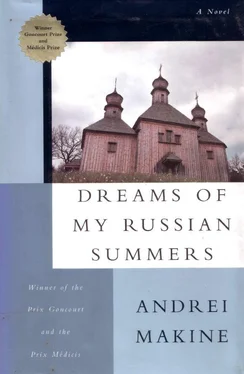Sometimes Pashka, in his search for a spot with more fish, drew dangerously close to the long slabs of dark ice, humid, undermined by springs… Hearing a crack, I would turn and see my comrade struggling in the water, digging with splayed-out fingers into the grainy snow. Running toward him, a few meters away from the breach, I would lie flat on my stomach and throw him the end of my scarf. Generally Pashka managed to escape before I could help him. Like a porpoise, he hurled himself out of the water and fell with his chest on the ice, then crawled away, leaving a long wet trail. But occasionally, probably just to please me, no doubt, he caught hold of my scarf and allowed himself to be rescued.
After a ducking like this we would go to one of the carcasses of old boats that could be seen, here and there, projecting out of the snowdrifts. We lit great wood fires in their blackened entrails. Pashka removed his large felt boots and his padded trousers and put them close to the flames. Then, with his bare feet resting on a plank, he began to grill the fish.
It was over these wood fires that we became more talkative. He told me of extraordinary fishing exploits (a fish too big to pass through the hole pierced by the brace and bit!); of thaws that, in the deafening breakup of the ice, carried away boats and uprooted trees and even izbas with cats clinging to the roof… I told him about tournaments between knights (I had just learnt that the warriors of old, on removing their helmets after a joust, had their faces covered in rust: iron plus sweat. I don't know why, but this detail thrilled me more than the tournament itself). Yes, I talked to him about those manly features accentuated with streaks of rust and about that young hero who sounded his horn three times to summon reinforcements. I knew that, as Pashka paced up and down on the banks of the Volga, in both summer and winter, he secretly dreamed of expanses of open sea. I was glad to find for him in my French collection the terrifying fight between a sailor and an enormous octopus. And, as my erudition was essentially nourished by anecdotes, I told him one suitably in keeping with his passion and our haven in the carcass of an old boat. Once on a perilous sea an English warship met a French vessel, and before embarking on a battle with no quarter, the English captain addressed his historic enemies, cupping his hands around his mouth: "You, Frenchmen, fight for money. But we, subjects of the Queen, we fight for honor!" Then from the French vessel this jovial riposte of the captain's could be heard blowing across in a gust of salt wind: "Each man fights for what he does not have, sir!"
One day he very nearly drowned for real. A whole slab of ice – we were in the midst of the thaw – gave way beneath his feet. Only his head appeared above the water, then an arm, seeking a nonexistent support. With a violent effort he hurled his chest up onto the ice, but the porous surface cracked beneath his weight. The current was already dragging on his legs; his boots were full of water. I did not have time to unroll my muffler; I lay flat on the snow, I crawled; I held out my hand to him. It was at that moment that I saw a brief glimmer of fear pass through his eyes… I believe he would have escaped without my help; he was too seasoned, too close to the forces of nature, to allow himself to be trapped by them. But this time he took my hand without his customary grin.
A few minutes later the fire was burning and Pashka, his legs bare and his body covered only by the long pullover I had lent him while his clothes dried, was prancing about on a plank licked by flames. With his red, skinned fingers he was kneading a lump of clay that he wrapped round the fish before putting it into the embers… Around us was the white desert of the Volga in winter; the willows with fine, trembling branches, which formed transparent thickets all along the bank; and buried under the snow, this boat, half disintegrated, whose timber fed our barbaric wood fire. The dancing of the flames seemed to make the twilight denser, the fleeting sensation of well-being more striking.
Why did I tell him the story on that day rather than any other?
There was no doubt a reason for it, something in our conversation that suggested the subject to me… It was a summary, and indeed a very brief one, of a poem by Hugo that Charlotte had narrated to me long ago, the title of which I could not even recall… Somewhere near the smashed barricades, soldiers were shooting insurgents in the heart of that rebellious Paris, where the paving stones had the extraordinary capacity to rear up suddenly as ramparts. A routine execution, brutal, pitiless. The men stood with their backs to the wall, stared for a moment at the barrels of the rifles aimed at their chests, then raised their eyes toward the lightly racing clouds. And they fell. Their comrades took their places facing the soldiers… Among these condemned men there was a kind of young Gavroche, whose age should have inspired clemency Alas, no! The officer ordered him to take his place in the fatal waiting line; the child had the same right to die as the adults. "We're going to shoot you as well!" snarled this executioner-in-chief. But a moment before going to the wall the child ran up to the officer and begged him, "Will you allow me to take this watch to my mother? She lives just round the corner from here by the fountain. I will come back, I swear it!" This childish trick touched even the hardened hearts of the soldiery. They guffawed; it seemed really too naive a ruse. The officer, roaring with laughter, declared, "Away with you, run. Make yourself scarce, little good-for-nothing." And they went on laughing as they loaded their rifles. Suddenly their voices were silenced. The child reappeared and, putting himself against the wall beside the adults, called out, "Here I am!
Throughout my story Pashka hardly seemed to be paying attention. He remained motionless, leaning toward the fire. His face was hidden beneath the turned-down brim of his big fur shapka . But when I reached the final scene – the child returns, his face pale and serious, and stands stock-still in front of the soldiers – yes, when I had spoken his final words, "Here I am!" Pashka shuddered and stood up… And something incredible happened. He stepped over the side of the boat and began walking barefoot in the snow. I heard a kind of stifled groaning that was rapidly dispersed over the white plain by the damp wind.
He took several steps, then stopped, sunk up to his knees in a snowdrift. Dumbfounded, I remained for a moment without moving, watching from the boat this great fellow clad in a stretched pullover that billowed in the wind like a short woolen dress. The earflaps on his shapka swayed slowly in the cold breeze. His bare legs thrust into the snow fascinated me. No longer understanding anything, I jumped over the side and went up to him. Hearing the crunch of my footsteps, he turned swiftly. His face was contorted in an unhappy grimace. An unaccustomed moisture in his eyes mirrored the flames of our wood fire. He hurried to wipe away these reflections with his sleeve. "Ugh, this smoke!" he complained, blinking his eyelids, and without looking at me, he went back to the boat.
* It was there, thrusting his frozen feet toward the embers, that he asked me with an angry insistence, "And after that? They shot him, that fellow, is that right?"
Caught on the hop and finding no enlightenment on this point in my memory, I stammered hesitantly, "Er… I don't know exactly…"
"What d'you mean, you don't know? But you told me the whole story!"
"No, but you see, in the poem…"
"I don't give a shit about the poem! In real life did they kill him or not?"
He stared at me over the flame with a slightly mad glint in his eyes. His voice came over as both rough and imploring. I sighed, as if to beg Hugo's pardon, and with a firm and clear tone I declared, "No, they didn't shoot him. There was an old sergeant there who was reminded of his own son back at his village. And he shouted, 'Whoever touches the boy will have to answer to me!' And the officer had to let him go…"
Читать дальше












